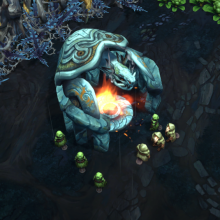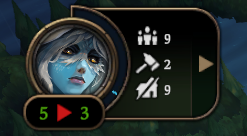Villagers
Overview
Villagers are the inhabitants of Viceroy settlements. The number and species of villagers you are going to have at the start of your settlement are determined by the Caravan you pick on the World Map. Newcomers come to your settlement at regular intervals (every 10 minutes by default). Additional villagers can also be obtained by completing Orders or Glade Events. There are also Cornerstones like Surprise Child that reward villagers every time their conditions are fulfilled.
Resolve
- Main article: Resolve
Each villager has a Resolve stat. Resolve is the main indicator of the villagers’ well-being. Please see Resolve for more information as it is a complication subject.
Species
Each villager is a member of one of 5 species. In any given settlement you are going to have only 3 species, and they are determined when you embark (not when the villager joins your settlement).
| Species | Description |
|---|---|
 Humans Humans
|
"An adaptable species, but very susceptible to the rain." |
 Beavers Beavers
|
"Beavers are hardworking and honest, but also quite demanding." |
 Lizards Lizards
|
"Lizards are a very resilient and distrustful species." |
 Harpies Harpies
|
"Harpies are a noble and fragile species, yet with a primal, aggressive side." |
 Foxes Foxes
|
"Foxes are majestic and mysterious creatures deeply bonded with the forest. " |
 Frogs Frogs
|
"A dignified and proud people with a unique affinity for wealth, renowned for their exceptional skills in architecture and their love of water." |
Resolve stats
Each species has the following stats describing their Resolve:
- Base Resolve
- The species's Resolve without any positive or negative effects.
- Resilience
- How fast the species' Resolve drops. A species with high Resilience loses Resolve about 4 times slower than low Resilience species.
- Demand
- Also called Resolve Threshold, how much Resolve a species needs before they start generating Reputation for their viceroy.
- Decadence
- How much their Demand rises after they earn their viceroy a Reputation Point through their own high Resolve.
- Hunger Tolerance
- The maximum amount of Hunger a villager can withstand before dying.
- Break Interval
- The minimum amount of time before a villager will take a break at a Hearth.
| Species | Base Resolve | Resilience | Demand (Resolve Threshold) | Decadence | Hunger threshold | Break interval |
|---|---|---|---|---|---|---|
| 15 | low | 30 | 4 | 6 | 2:00 | |
| 10 | low | 30 | 2 | 6 | 2:00 | |
| 5 | high | 15 | 7 | 12 | 1:40 | |
| 5 | low | 15 | 3 | 4 | 1:40 | |
| 5 | low | 15 | 5 | 3 | 2:00 | |
| 10 | medium | 25 | 5 | 8 | 2:30 |
Specializations
Each species has the following two types of specializations:
- Proficiency Specialization
- Grants most villagers a 10% chance to produce twice the amount of resources when working in that specialization. For
 Foxes, their
Foxes, their  Forest Proficiency Specialization grants them +5% working speed on Glade Events.
Forest Proficiency Specialization grants them +5% working speed on Glade Events. - Comfort Specialization
- Grants villagers +5 to their individual Resolve when working in that specialization.
| Species | Comfort | Proficiency |
|---|---|---|
| Blightrot | ||
| Masonry |
Needs
- Main articles: Housing Need, Complex Food Need, Clothing Need, Services Needs
Each species has the following needs:
- Shelter Need
- Also called Basic Housing, every species but Frogs needs to have a roof of some kind over their head.
- Housing Need
- Also called Species-specific Housing, their need for the comforts of home unique to their species.
- Complex Food Need
- Their need for tasty food that isn't raw, but cooked or made up of several ingredients to their liking.
- Service Need
- Their need for consumption of fine goods related to comforts, relaxation, and self-improvement.
| Species | Housing Need | Complex Food Needs | Clothing Needs | Services Needs | |||||
|---|---|---|---|---|---|---|---|---|---|
 Humans Humans
|
|||||||||
 Beavers Beavers
|
|||||||||
 Lizards Lizards
|
|||||||||
 Harpies Harpies
|
|||||||||
 Foxes Foxes
|
|||||||||
 Frogs Frogs
|
Frog Housing |
Workers
Villagers can be assigned to Hearths, Camps, Farms, Mines, production buildings, Service buildings, Geyser Pumps, Warehouses, Blight Posts, and Glade Events. Once assigned, villagers will immediately begin performing their work, unless they were on a break or travelling to the nearest Hearth to take a break, in which case they finish their break first before starting with their job. All unassigned villagers count as builders.
When villagers die, an alert appears telling you what job the villager had. You can click on the alert to show their workplace.
| Name of Job | Building |
|---|---|
| "Blight fighter" | Blight Post |
| "Craftsman" | Makeshift Post |
| "Druid" | Druid's Hut |
| "Farmer" | Farms |
| "Firekeeper" | Hearths |
| "Gatherer" | Gathering Camps |
| "Hauler" | Warehouses |
| "Scout" | Glade Events |
| "Woodcutter" | Woodcutters' Camp |
| "Miner" | Mine |
| "Worker" | Either generically, or the alert may specify "Greenhouse Worker" identifying that the worker was in the Greenhouse. |
Caravans
Main article: Embarking
The caravan you pick before Embarking, along with the Embarkation points you spend, are going to determine the species and number of your starting villagers, as well as your starting resources. You only have 2 caravans available in the caravan menu when starting out. In order to unlock the third one, you have to acquire Pioneers’ Gate level 5 upgrade.
Only 1 or 2 of the starting species can be known before you start a settlement, never all 3. All 3 species are set in stone upon Embarkation - there is no way to affect what species your settlement is going to have after Embarkation.
Before World Events increase or decrease the number of starting villagers, every caravan has 6-8 villagers and a 50% chance for 2 additional villagers.
 Hooded Horse Wikis
Hooded Horse Wikis


